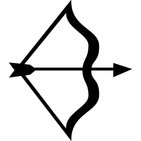weekly column
|
Each week, find a commentary on something connected to verses of Torah or another source of wisdom
|
|
Each week, find a commentary on something connected to verses of Torah or another source of wisdom
|
 The Genesis:3 Project Take your gear, your quiver and bow, and go out into the open and hunt me some game. Genesis 27:3 I remember the story that Leonard Fein, of blessed memory, used as an introduction to his book Where Are We? some twenty-five years ago. His telling was wonderful and used extravagant language, but I boil it down to the punchline. A Jew in Europe represented to his non-Jewish friend that Jews were morally superior because they don’t hunt. The non-Jew responded with disdain, “You don’t hunt because we won’t let you have guns.” I have written before about my friend David Currie from San Angelo, Texas. He is a hunter who has drawn many lessons about life and ethics from his love of hunting. He likely has a much better relationship with the miracles and mysteries at the beginning and end of life because he attends to the well-being of the herds he raises and culls on his ranch. When he reads this verse from the Bible, he understands what Jacob is asking of Esau. Not me. In the fifty years or so that I have lived in and taught about the Jewish dietary laws, kashrut, I have been unable to imagine hunting as a pastime, let alone a profession. Proponents of hunting (and not just the over-the-top big game sportsmen) may consider me something of a wuss. They might rightly suggest that I am willing to consume the harvest of meat produced commercially but unwilling to participate in the production of that food for myself. Opponents of eating meat at all, on the other hand, may consider me something of a hypocrite. They might rightly suggest that I am willing to rationalize the taking of life for my own enjoyment as long as I don’t have to do it myself. But I am not alone. Throughout the long, long history of Biblical commentary, Jewish scholars have twisted and turned to explain away Isaac’s request to his son. The faithful rabbis who looked at the verse above could not imagine that Isaac did not keep kosher much the same as they did, even if the dietary laws were not revealed for many generations or refined for many more generations. Isaac, they believed, learned kashrut from his father Abraham, who intuited all of the Torah long before it was delivered to Moses. And Esau, the recipient of the instructions, was reminded by his father of the five steps necessary for kosher slaughter by an extraneous letter at the end of the word for “game,” according to a number of the commentators. I admire their piety, even if I am possessed of a skepticism about their teachings. They, like me, were repelled by the notion of hunting – even the ones who worked as ritual slaughterers. Likely they believed, like the Jew in Fein’s story, that they were somehow more refined and morally evolved than those who would wage war on innocent animals. Mind you, there were not many Jewish scholars who suggested that Jews did not fight when necessary. There are probably just as many verses in the Bible devoted to instructions and stories about armed conflict as there are about ritual preparation of animals for food and sacrifice. Our post-Biblical history is filled with examples of Maccabees and anti-Roman guerillas and mercenaries around the Mediterranean. And the past hundred years have seen the resurgence of that Jewish reputation as fierce warriors. But hunting seemed – I don’t know – somehow gratuitous to them. Combined with the strict prohibition in the Torah against consuming blood, it just mostly isn’t done. Finding Jewish hunters has been rare and finding religious Jewish hunters has been rarer still. When Jews use weapons for sport, they are aiming at inanimate objects, clay discs or digital images. So does our aversion to hunting that is so deeply ingrained that we offer sacred misreadings of the Bible make us the morally superior human beings that Leonard Fein’s Jew claims we are? Now it is worth back-filling the story. The conversation with the non-Jew was initiated when the Jew grew weary of speculation about a return to the Holy City of Jerusalem with his Jewish friends. But when they heard the scorn of the non-Jew, they became sudden proponents of returning immediately to the Land. “We must go there immediately!” they declared. “There we will carry guns as free men and we will show them that even with guns we will not become hunters.” Of course, the story implies a rueful ending. But it raises intriguing questions. Were we better off with the self-deception that came with lack of opportunity? Are we indeed able to live up to the better angels we claim to emulate? Can we really afford to be so selective about the lessons of our past? I am certain you can think of others. I have one more. A new friend of mine from my interfaith work is an Evangelical pastor from the deep south. He has done remarkable work in building bridges with Muslims, some of it by taking imams on a hunting trip. The offer will be open to me as he seeks to expand his outreach. It will require me to answer in the singular the question Leonard Fein adapted for his book title: where am I?
0 Comments
Leave a Reply. |
Archives
October 2023
Categories |